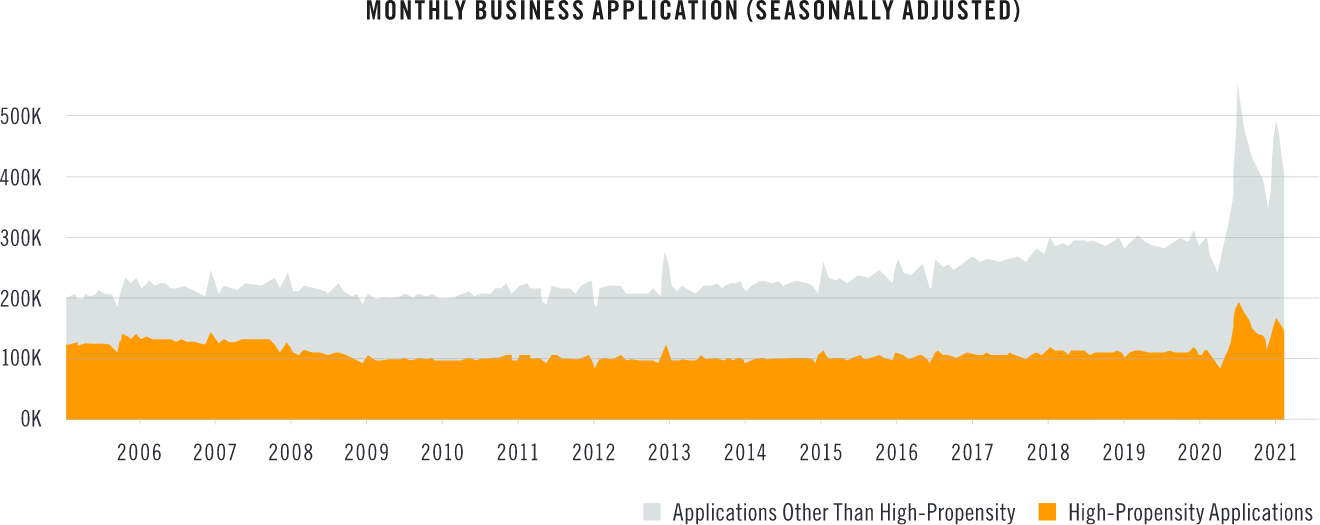Ingenuity and Technology Drives a Surge of New Businesses
FEATURED INSIGHT
Ingenuity and Technology Drives a Surge of New Businesses
1st Quarter 2021
The past 12 months may prove to be one of the most consequential periods of our lifetime, though not for the reasons that immediately come to mind. Understandably, the most salient memories of 2020 revolve around reduced activity—stay-at-home orders, closed businesses, and canceled trips, family gatherings, and events. But in the long-term, the most important story may be just how active we really were.

After a momentary dip in the first weeks of the COVID-19 pandemic, new business applications in the United States exploded to record levels and have remained well above historical averages through the first quarter of 2021. Millions of Americans, rather than freezing, channeled their energy and ingenuity into building something new. This surge has profound implications for the pace and sustainability of our ongoing economic recovery. It is a testament to the grit and resilience of our friends, neighbors, and community members.
There are also some interesting questions to ponder. Why this spike in 2020 when no such phenomenon occurred during the financial crisis of 2008? And how were so many businesses started during widely prevalent restrictions on mobility and capacity?
While there is not a single answer to these questions, a substantial component of this phenomenon is the rise of technology and service providers that dramatically lower the barriers to starting a business. For instance, in recent years GoDaddy, Inc. (GDDY) has expanded beyond its core domain registration business to offer entrepreneurs a robust and growing suite of technology solutions that encompasses commerce, payments, and productivity tools. Amazon (AMZN) offers its well-known marketplace to upstart retailers, but also makes cloud infrastructure, big data, supercomputing, and analytics available to businesses of any size through its Amazon Web Services division. And thanks to Google (GOOGL), entrepreneurs need not carve out giant advertising budgets to be able to effectively reach potential customers.
Beyond technology, infrastructure, and advertising, companies like Fiverr (FVRR) are also creating platforms which allow small business owners and freelancers to efficiently connect and contract services such as web development, video production, translation, and social media campaigns, among many others. Each service has its own “SKU” (stock keeping unit), allowing a customer to purchase a specific deliverable for a fixed price. According to Fiverr, the average time to procure a service is 15 minutes.
In the years and decades ahead, we expect Fiverr and marketplaces like it to grow dramatically. In Fiverr’s case, we expect the platform to be successful due to the substantial value they provide to both businesses and freelancers. Rather than hiring full time employees or spending months sourcing technical talent, start-ups can rapidly obtain high quality services at a compelling price point. Freelancers, meanwhile, gain a distribution channel unconstrained by geography or personal network, allowing them to monetize their talents more efficiently and effectively.
As long-term investors seeking companies which will sustainably grow their earnings power throughout the next business cycle, Riverbridge is focused on win-win-win scenarios. If history is a guide, there were businesses started in the last year which will someday go public and become household names. Customers, employees, and investors will benefit from the organizations that had the courage and ingenuity to begin building amid a crisis. Riverbridge will continue to seek out these businesses and leaders who are adding enduring value to their stakeholders.
Information in this newsletter is not intended to be used as investment advice. Mention of companies/stocks herein is for illustrative purposes only and should not be interpreted as investment advice or recommended securities. The securities identified do not represent all of the securities purchased, sold or recommended and the reader should not assume that any listed security was or will be profitable. Past performance is not indicative of future results.

David Choe
Portfolio Manager

David Choe
CFA

